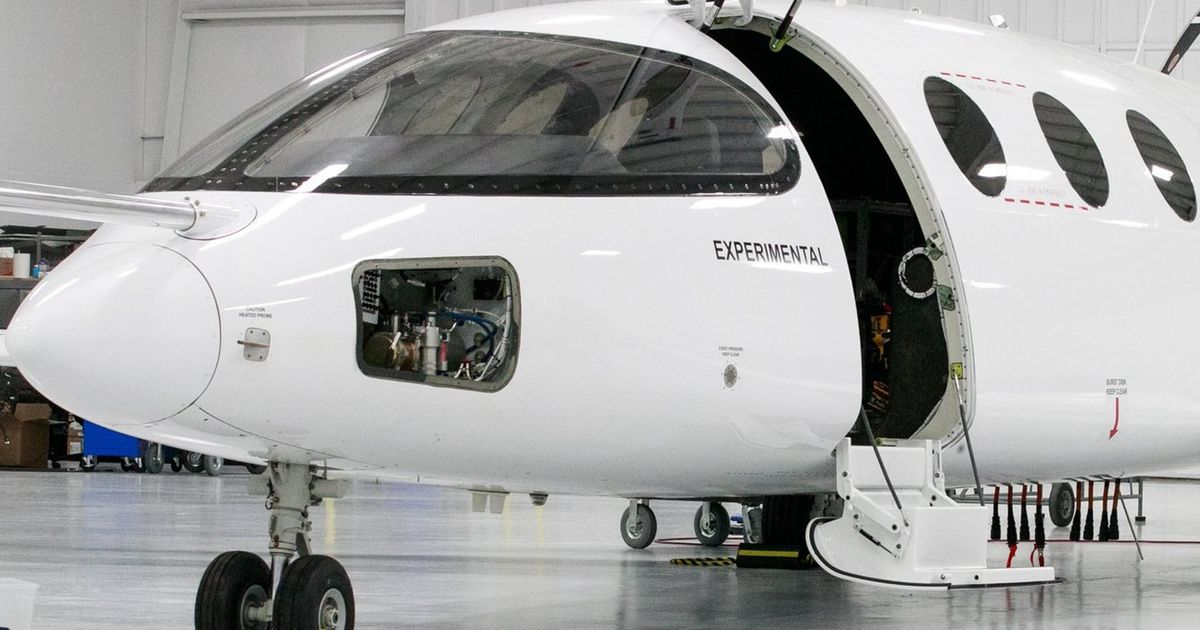[ad_1]
FARNBOROUGH, ENGLAND — Electric airplane concepts are everywhere at the Farnborough Air Show this year, often just mock-ups of early prototypes developed by startups.
Lee Human is here to drive business from these innovative projects for his Seattle-based aerospace engineering company, AeroTEC.
While neither Airbus nor Boeing will launch a brand new plane for a few years, several well-funded startups are trying to create small electric planes to decarbonize flight. Although many will fail, in the meantime they have created exciting and challenging work for aerospace engineers in Seattle.
“It’s an amazing time to be in aerospace,” Human said. “We haven’t had new propulsion systems available to us since the invention of the jet engine.”
It already has four electric aircraft projects underway that AeroTEC is bringing closer to reality. Soon some will be flying at Moses Lake in central Washington, which has become a proving ground for new jet-propelled aircraft.
- Eviation’s all-new Alice aircraft is at AeroTEC’s Moses Lake facility and its delayed first flight is scheduled for later this summer.
- A technology demonstrator for Universal Hydrogen is also there, a de Havilland Dash 8-300 turboprop that AeroTEC is modifying and plans to fly later this year.
- AeroTEC is also working with NASA on a hybrid electric aircraft demonstrator, this one a modified de Havilland Dash 7 that is expected to fly in 2024.
- And AeroTEC is helping Los Angeles-based electric aviation company Surf Air Mobility develop and certify hybrid-electric and all-electric propulsion systems for Cessna Grand Caravan aircraft.
Human told Farnborough he had met “three new companies that make electric fixed-wing aircraft that we might be able to work with.”
“I had several other meaningful meetings with other companies that are either developing upgrades to existing aircraft or brand new aircraft,” he added.
Human founded AeroTEC in 2001. From its engineering office in Seattle and its flight test center in Moses Lake, it offers flight testing, data analysis and Federal Aviation Administration certification services for aircraft manufacturers and modifiers.
It had about 250 employees before the pandemic, fell to about 170, and has now returned to about 220 employees and hires.
About 160 of them are engineers and business support services in Seattle. About 40 mechanics and technicians as well as a few engineers are at Moses Lake. AeroTEC also has a small manufacturing facility in Arlington and a new engineering office in Wichita, Kansas.
Working on innovative aircraft is not an infallible undertaking.
Two previous major projects AeroTEC was working on have collapsed: the Mitsubishi regional jet and the supersonic Aerion business jet.
Human said it guards against such setbacks and cuts costs by subcontracting work to offshore engineering teams.
At Farnborough, he met the CEO of Tucana, a Ukrainian engineering company forced to move to Armenia after the Russian invasion began.
“We do the architecture and put together the fundamental design, and they do what we call core product engineering,” he said. “They will take our models and make detailed drawings. They are incredibly impressive.
On current projects, AeroTEC has worked with Eviation since the first version of Alice, now developed into a sleek, battery-powered aircraft that can carry nine passengers and two crew.
“We finalized the design work a year ago,” Human said. “We are now re-engaged to provide additional support to prepare for the first flight.”
This flight was scheduled last year, but has been repeatedly delayed.
“There are a lot of new technologies applied to aircraft. And yes, there were some serious start-up difficulties in integrating these technologies to make them work,” Human said. “The Evation team did a very good job. The plane will fly when it is safe.
For Universal Hydrogen, the Dash 8 will be equipped with hydrogen tanks powering a hydrogen fuel cell which, along with backup batteries, supplies electricity to an electric motor designed and built by MagniX of Everett.
One engine will run on hydrogen, the other on regular aviation gas.
AeroTEC has “essentially completed the final design and is now in the manufacturing and modification phase of the project,” Human said.
Working with NASA’s Electrified Powertrain Flight Demonstration Project, MagniX will provide the motors while AeroTEC will integrate these motors into the Dash 7’s airframe.
“This project is for learning,” Human said. “We will do operational missions with the aircraft to gain experience with a full-scale hybrid electric aircraft.”
Finally, with Surf Air Mobility, MagniX will again supply the electric motors and AeroTEC will integrate them into the Grand Caravan’s airframe and have it certified to carry passengers.
Aiming to enter service in 2025, it could potentially become the first fully certified electric aircraft.
[ad_2]
Source link

